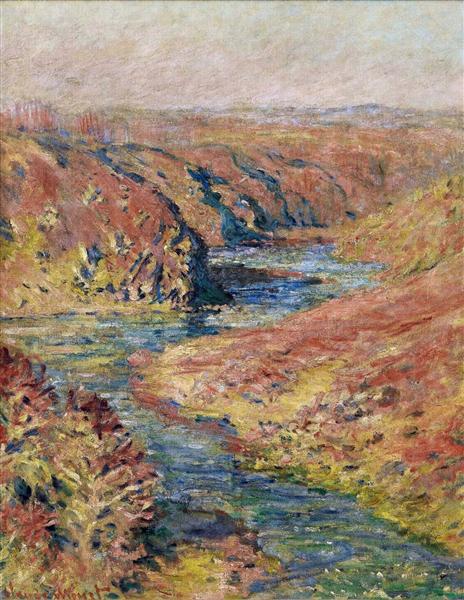תיאור
Claude Monet's 1889 painting The Creuse Valley at Fresselines offers a vibrant and evocative view of the French landscape, a subject that the Impressionist master immersed himself in intensely throughout his career. This painting, like many of Monet's creations, is situated at the confluence of nature and light, revealing to the viewer the artist's deep connection with his surroundings.
When looking at the work, the first thing that stands out is the carefully balanced composition, in which the viewer is invited to wander through the landscape. The scene is structured on a medium plane where a valley spreads out, displaying a series of green, blue and brown tones, forming a delightful mosaic of the local flora. The perspective is treated in such a way that depth feels almost tangible; the hills in the distance are gently outlined against a sky that unfolds in a subtle play of clouds, illuminated by the golden light of the sun that conveys a sense of calm and serenity.
Monet is known for his skillful use of color, and in this work he does not disappoint. The palette is rich and nuanced, with vibrant greens predominating to represent the vegetation of the valley, while the blues and white of the sky contrast harmoniously with the earthy colors. This handling of color not only brings the painting to life, but also reveals the constantly changing light and atmosphere that Monet strove to capture, a fundamental aspect of the Impressionist movement.
At first glance, one might notice the absence of human characters in this work. However, this choice is deliberate, allowing the landscape to speak for itself. The lack of figures provides a sense of solitude and connection with nature, privileging the splendor of the natural surroundings without distractions. This shows Monet's fascination with the landscape as a living organism, an echo of his belief that nature and light should be the focus of attention.
It is important to consider the context in which this work was created, which is set during one of Monet's most productive periods. At that time, the artist was deeply influenced by his stay in the Creuse region, where he sought to express his impressions of the landscape in a style that was far removed from the academic norms of the time. The choice of location also reflects a return to a rural world much appreciated by the Impressionists, who found inspiration in less industrialised landscapes.
"The Creuse Valley at Fresselines" is emblematic not only of Monet's technique, but also of his ability to evoke emotion through the depiction of the natural environment. The work invites the viewer to immerse themselves in its freedom and splendor, an aspect that distinguishes it within his vast output. Monet, with his mastery in capturing light and color, not only documents a landscape, but also offers us a poetic moment that transcends its time, enveloping the observer in a visual experience that is both intimate and universal. Thus, this painting stands as a manifestation of the impressionist legacy, inspiring future generations to see beyond what is on the surface and find the inherent beauty in nature itself.
KUADROS ©, a famous painting on your wall.
Hand-made oil painting reproductions, with the quality of professional artists and the distinctive seal of KUADROS ©.
Painting reproduction service with satisfaction guarantee. If you are not completely satisfied with the replica of your painting, we will refund 100% of your money.

